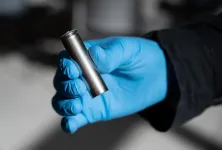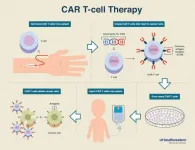(Press-News.org) A new fabrication technique could allow solid-state automotive lithium-ion batteries to adopt nonflammable ceramic electrolytes using the same production processes as in batteries made with conventional liquid electrolytes.
The melt-infiltration technology developed by materials science researchers at the Georgia Institute of Technology uses electrolyte materials that can be infiltrated into porous yet densely packed, thermally stable electrodes.
The one-step process produces high-density composites based on pressure-less, capillary-driven infiltration of a molten solid electrolyte into porous bodies, including multilayered electrode-separator stacks.
"While the melting point of traditional solid state electrolytes can range from 700 degrees Celsius to over 1,000 degrees Celsius, we operate at a much lower temperature range, depending on the electrolyte composition, roughly from 200 to 300 degrees Celsius," explained Gleb Yushin, a professor in the School of Materials Science and Engineering at Georgia Tech. "At these lower temperatures, fabrication is much faster and easier. Materials at low temperatures don't react. The standard electrode assemblies, including the polymer binder or glue, can be stable in these conditions."
The new technique, to be reported March 8 in the journal Nature Materials, could allow large automotive Li-ion batteries to be made safer with 100% solid-state nonflammable ceramic rather than liquid electrolytes using the same manufacturing processes of conventional liquid electrolyte battery production. The patent-pending manufacturing technology mimics low-cost fabrication of commercial Li-ion cells with liquid electrolytes, but instead uses solid state electrolytes with low melting points that are melted and infiltrated into dense electrodes. As a result, high-quality multi-layered cells of any size or shape could be rapidly manufactured at scale using proven tools and processes developed and optimized over the last 30 years for Li-ion.
"Melt-infiltration technology is the key advance. The cycle life and stability of Li-ion batteries depend strongly on the operating conditions, particularly temperature," Georgia Tech graduate student Yiran Xiao explained. "If batteries are overheated for a prolonged period, they commonly begin to degrade prematurely, and overheated batteries may catch on fire. That has prompted nearly all electric vehicles (EV) to include sophisticated and rather expensive cooling systems." In contrast, solid-state batteries may only require heaters, which are significantly less expensive than cooling systems.
Yushin and Xiao are encouraged by the potential of this manufacturing process to enable battery makers to produce lighter, safer, and more energy-dense batteries.
"The developed melt-infiltration technology is compatible with a broad range of material chemistries, including so-called conversion-type electrodes. Such materials have been demonstrated to increase automotive cell energy density by over 20% now and by more than 100% in the future," said co-author and Georgia Tech research scientist Kostiantyn Turcheniuk, noting that higher density cells support longer driving ranges. The cells need high-capacity electrodes for that performance leap.
Georgia Tech's technique is not yet commercially ready, but Yushin predicts that if a significant portion of the future EV market embraces solid-state batteries, "This would probably be the only way to go," since it will allow manufacturers to use their existing production facilities and infrastructure.
"That's why we focused on this project - it was one of the most commercially viable areas of innovation for our lab to pursue," he said.
Battery cell prices hit $100 per kilowatt hour for the first time in 2020. According to Yushin, they will need to drop below $70 per kilowatt hour before the consumer EV market can fully open. Battery innovation is critical to that occurring.
The Materials Science lab team currently is focused on developing other electrolytes that will have lower melting points and higher conductivities using the same technique proven in the lab.
Yushin envisions this research team's manufacturing advance opening the floodgates to more innovation in this area.
"So many incredibly smart scientists are focused on solving very challenging scientific problems, while completely ignoring economic and technical practicality. They are studying and optimizing very high-temperature electrolytes that are not only dramatically more expensive to use in cells but are also up to five times heavier compared with liquid electrolytes," he explained. "My goal is to push the research community to look outside that chemical box."
INFORMATION:
In addition to Yushin, Xiao and Turcheniuk, co-authors included Aashray Narla, Ah-Young Song, Alexandre Magasinski, Ayush Jain, Sheirley Huang, and Haewon Lee from Georgia Tech, and Xiaolei Re from both Georgia Tech and Chongqing Technology and Business University in China.
This work was mostly supported by Sila Nanotechnologies Inc., a Georgia Tech startup, with characterization performed at the Materials Characterization Center at Georgia Tech. Any opinions, findings, and conclusions or recommendations expressed in this material are those of the authors and do not necessarily reflect the views of the sponsoring organization.
Gleb Yushin is co-founder, CTO, and a stockholder of Sila. Yushin is entitled to royalties derived from Sila's sale of products related to the research described in this paper. This study could affect his personal financial status. The terms of this arrangement have been reviewed and approved by Georgia Tech in accordance with its conflict of interest policies.
CITATION: Y. Xiao, et al., "Electrolyte Melt-Infiltration for Scalable Manufacturing of Inorganic All-Solid-State Lithium-Ion Batteries." (Nature Materials, 2021) https://dx.doi.org/10.1038/s41563-021-00943-2.
You've heard of animals that can lose and then regenerate a tail or limb. But scientists reporting in the journal Current Biology on March 8 have now discovered two species of sacoglossan sea slug that can do even better, shedding and then regenerating a whole new body complete with the heart and other internal organs. The researchers also suggest that the slugs may use the photosynthetic ability of chloroplasts they incorporate from the algae in their diet to survive long enough for regeneration.
"We were surprised to see the head moving just after autotomy," said Sayaka Mitoh of Nara ...
It's no secret that the United States' $13 billion cannabis industry is big business. Less obvious to many is the environmental toll this booming business is taking, in the form of greenhouse gas emissions from commercial, mostly indoor production.
A new study by Colorado State University researchers provides the most detailed accounting to date of the industry's carbon footprint, a sum around which there is only limited understanding. What is clear, though, is that consumer demand for cannabis is insatiable and shows no signs of stopping as more states sign on to legalization.
The study, ...
The economic benefits of conserving or restoring natural sites "outweigh" the profit potential of converting them for intensive human use, according to the largest-ever study comparing the value of protecting nature at particular locations with that of exploiting it.
A research team led by the University of Cambridge and the Royal Society for the Protection of Birds (RSPB) analysed dozens of sites - from Kenya to Fiji and China to the UK - across six continents. A previous breakthrough study in 2002 only had information for five sites.
The findings, published in the journal Nature Sustainability, come just weeks after a landmark report by Cambridge Professor Partha Dasgupta called for the value of biodiversity to be placed at the heart of global economics.
For the latest ...
Coastal populations are experiencing relative sea-level rise up to four times faster than the global average - according to new research from the University of East Anglia.
A new study published today in Nature Climate Change is the first to analyse global sea-level rise combined with measurements of sinking land.
The impact of subsidence combined with sea-level rise has until now been considered a local issue rather than a global one.
But the new study shows that coastal inhabitants are living with an average sea level rise of 7.8 mm - 9.9 mm per year over the past twenty years, compared with a global average rise of 2.6mm a year.
And the impacts are far larger than the global numbers reported ...
LA JOLLA--(March 8, 2021) Deep learning is a potential tool for scientists to glean more detail from low-resolution images in microscopy, but it's often difficult to gather enough baseline data to train computers in the process. Now, a new method developed by scientists at the Salk Institute could make the technology more accessible--by taking high-resolution images, and artificially degrading them.
The new tool, which the researchers call a "crappifier," could make it significantly easier for scientists to get detailed images of cells or cellular structures that have previously been difficult to observe because they require low-light conditions, such as mitochondria, which can ...
What The Study Did: Researchers assessed the number of hospital admissions for noncommunicable diseases (abnormal tissue growths, metabolic diseases, cardiovascular diseases and musculoskeletal diseases) in São Paulo, Brazil, between January and June last year compared with the corresponding periods in the previous three years.
Authors: Fernando Adami, Ph.D., of the Laboratório de Epidemiologia e Análise de Dados, Centro Universitário Saúde ABC in São Paulo, Brazil, is the corresponding author.
To access the embargoed study: Visit our For The Media website at this link https://media.jamanetwork.com/
(doi:10.1001/jamanetworkopen.2021.0799)
Editor's Note: Please ...
Menlo Park, Calif. -- Scientists have taken a major step forward in harnessing machine learning to accelerate the design for better batteries: Instead of using it just to speed up scientific analysis by looking for patterns in data, as researchers generally do, they combined it with knowledge gained from experiments and equations guided by physics to discover and explain a process that shortens the lifetimes of fast-charging lithium-ion batteries.
It was the first time this approach, known as "scientific machine learning," has been applied to battery cycling, said Will Chueh, an associate ...
Hamilton, ON (March 8, 2021) - Many parents know the struggle of having to make children with pneumonia finish the usual 10-day course in antibiotics despite the child feeling better after a few days of medication.
New research from McMaster University has proven that a five-day course of high-dose amoxicillin will do just as well for children six months to 10 years old with common pneumonia.
"Several studies have proven that adults with pneumonia do fine with short courses of antibiotics, and now we have proved a short course of antibiotics also works for children," said Dr. Jeffrey ...
A study from North Carolina State University found outdoor play and nature-based activities helped buffer some of the negative mental health impacts of the COVID-19 pandemic for adolescents.
Researchers said the findings, published in the International Journal of Environmental Research and Public Health, point to outdoor play and nature-based activities as a tool to help teenagers cope with major stressors like the COVID-19 pandemic, as well as future natural disasters and other global stressors. Researchers also underscore the mental health implications of restricting outdoor recreation opportunities for adolescents, and the need to increase ...
DALLAS - March 8, 2021 - A new type of CAR T-cell therapy more than triples the expected length of remission for multiple myeloma patients who have relapsed several times, according to an international clinical trial with UT Southwestern as the lead enrolling site.
Results of the trial, published recently in the New England Journal of Medicine, were significantly better than those seen with other therapies available to heavily relapsed and refractory myeloma patients who had already received the three main classes of treatment. Nearly three-quarters of the patients had at least a partial response to the therapy. About a third achieved a complete remission, with the disappearance of all traces of cancer.
Median time without the disease worsening was 8.8 months with this new ...



